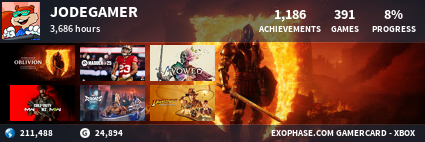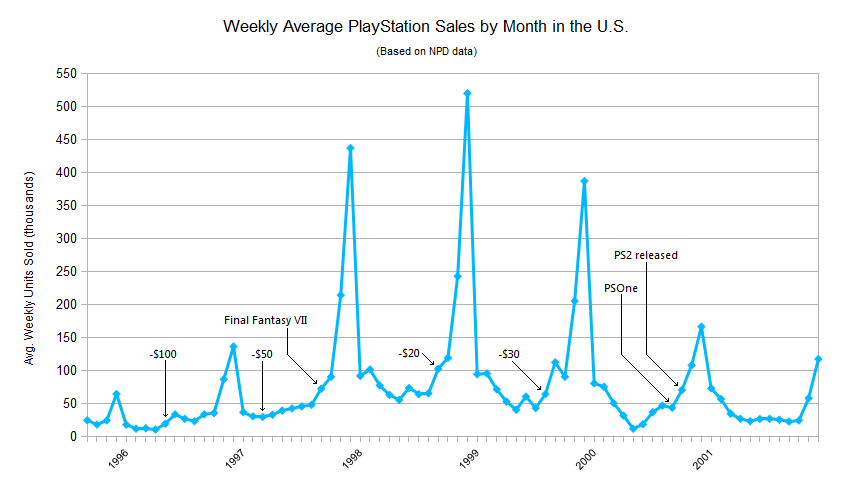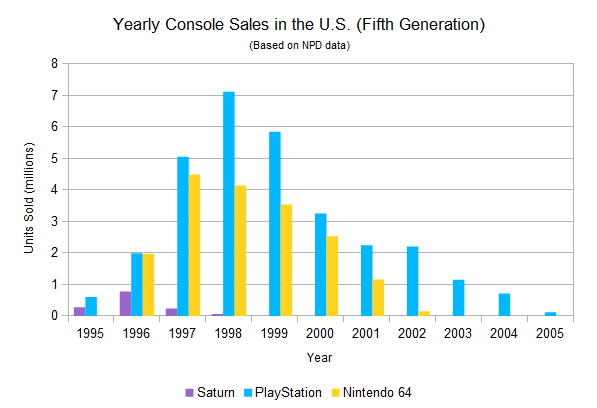Shadow1980 said:
RolStoppable said:
It only sounds like a tough challenge for Switch because you still cling to your incomplete datasets that are the basis for all of your analyses. Since there's no NPD data for the NES and barely anything about the SNES, you don't even have complete data for Nintendo home consoles. The handheld market is something you ignore in general despite having a lot of data for it, I put that down to your personal bias.
Two major things that Switch has going for it are that it is Nintendo's only console and will therefore receive all of the software support, and the console covers both the home console and handheld market. You keep overlooking Switch's handheld component which lends itself to multiple revisions and therefore big factors to stabilize good sales momentum in the long term. After all, you always say how hardware revisions have helped Sony and Microsoft home consoles in the long run.
Why did Wii sales slow down so much? For one, it seriously ran out of software support from 2011 onwards, and two, it didn't get a noteworthy hardware revision. Chances are that Switch matches those 14.66m of the Wii from 2010-2014 with just 2020 and 2021 alone and with momentum like that it will be quite easy to make up the remaining deficit of 9.1m in the following years. Multiple Switch consoles in a household will become a common thing. All Nintendo handhelds have sold 20m+ units in the USA, so you should add at least 10m units to what you project Switch to sell as a home console.
|
"Bias"? C'mon, man. When have you known me to be biased towards or against any of the Big Three? I always try to be as impartial as possible.
I do not think it is imperative that we include the NES and SNES when comparing the Switch to the Nintendo systems we do have complete data for. For one, those systems were supported for a much longer time than any subsequent Nintendo console, with decent amounts of software coming out even after their successors were released. Even Nintendo released some games for both after their successors were released. Meanwhile, the N64, GC, and Wii U had essentially no appreciable software support after they were replaced (in fact, the Wii U was discontinued before it was replaced), and though the Wii had a fair amount of games released for it after the Wii U launched, none of them were Nintendo games, and nearly all were party games or second- & third-rate licensed titles, so it doesn't really count as having strong late-life software support, either.
And Nintendo's handhelds haven't had consistently strong software support after they were replaced, either. The Game Boy quickly stopped getting games once the GBC was released (even though the GBC was part of the same hardware family). Support for the GBC dried up quickly once the GBA was released. The DS had only a handful of games released after the 3DS was released. The GBA was the one exception, as it did have some solid support until 2007 (though Nintendo's support was largely minimal), three years after the DS was released, but then again the DS apparently wasn't initially intended to replace the GBA. Likely because of these factors, the GBA had the best legs of any Nintendo handheld, at least in absolute terms, with over 8.6M units sold from 2005 to 2007 (the DS sold 6.37M from 2011 to 2013, while the GB and GBC flatlined the year after they were replaced). With no official replacement for the 3DS (the Switch wasn't intended to replace it), it's hard to gauge its legs as there's no viable reference point to make comparisons, through from 2014 to 2017 it was essentially flat so in relative terms it wasn't dropping fast even by Year 7. However, the 3DS has no more software support on the horizon, so its sales, which are already declining quickly, will probably dry up even quicker.
Seeing as over the past 20 years Nintendo hasn't supported either their home consoles or their handhelds once an official replacement is released, we shouldn't expect anything different with the Switch. Assuming the Switch gets an official replacement, we should see first-party support vanish quickly after that point. We shouldn't expect much from third parties either in the long run, as while it's gotten a few token titles of note, once third parties move fully to PS5 and Scarlett it probably won't even get that much.
Regarding hardware revisions, I am taking that into account. Typically, Nintendo releases at least one major hardware revision for its handhelds, and the Switch does technically have the form factor of a handheld, so you're right that we should expect a Switch revision, which the rumor mill suggests is on the way. The Game Boy had the Pocket and Color (the latter technically a replacement for previous models, even though it was just an upgraded Game Boy and officially part of the same hardware family), and what data we have shows the latter doing amazing after years of declining sales of the older models. The GBA had the "SP" model, which gave sales a solid boost for about a year (the March 2003 - Feb. 2004 period was up 19.8% over the previous 12-month period). The DS had the Lite, which caused its initially unimpressive sales to have a massive spike in its baseline (which actually continued to improved over the next three years), and the DSi, which caused a significant short-term boost. The 3DS had the XL and 2DS, which had no real effect on sales, and the New 3DS, which did cause a major but very short-term spike in sales.
So, what will the Switch get for its hardware revisions? A handheld-only "Mini" model with a better battery/lower power consumption so it'll last more than two hours? A higher-end model capable of higher resolutions and better performance in general? We don't know since Nintendo hasn't deemed it necessary to tell us yet. But I tend to lean towards conservative estimates for any system when projecting future sales, so whatever hardware revision(s) we get I am assuming provides a significant but relatively short-term boost. Is it possible it could cause a major long-term boost to sales? Sure. Do I think it'll do anything like the DS Lite or Game Boy Color? Not a chance in hell. I think a best-case scenario would be something more akin to the GBA SP, where the revision causes a solid boost lasting maybe a year at most.
Let's assume that the Switch continues to average between 25-30% YoY growth for the remainder of the year, plus an additional 500k for hardware moved by Pokemon S&S. That would put it at the 7.5-7.8M range, which I think is a solid upper limit. Assuming the Switch's hardware revision comes out in Q1 2020, I could potentially see maybe around 8.5M for next year as an absolute best-case scenario for next year, but if the effects are more short-lived we could see sales that are flat or maybe even down from this year. I'll split the difference and go with an even 8 million. Let's further assume that 2021 is the start of the decline phase of the Switch's life, but with a relatively modest ~20% YoY decline for both 2021 and 2022, with the Switch's successor releasing in 2023, causing sales to drop by 40-50%, and then sales rapidly flatlining afterward (2-2.5M tops for 2024 & beyond).
We could see a scenario like this:

That would be enough to just barely pass the Wii in the U.S.
But I consider that an absolute best-case scenario. Again, could it happen? Certainly. Will it happen? I wouldn't be willing to bet on it.
Now, I will admit that, after looking back over my data, 35M as a median is indeed too low, though I think it is a good low-end figure for the Switch. We shouldn't expect it to sell significantly less than that. 41-42M is as I said the highest I expect it to go; I don't see it blowing past the Wii's lifetime total by a significant margin. So, that would mean 38M is a good mid-range estimate. Still about 3.8M million short of the Wii, but an impressive figure to be certain.
|




















































